Module 9 People and places>Unit 2 They’re waiting for buses or trains.
文档属性
| 名称 | Module 9 People and places>Unit 2 They’re waiting for buses or trains. |
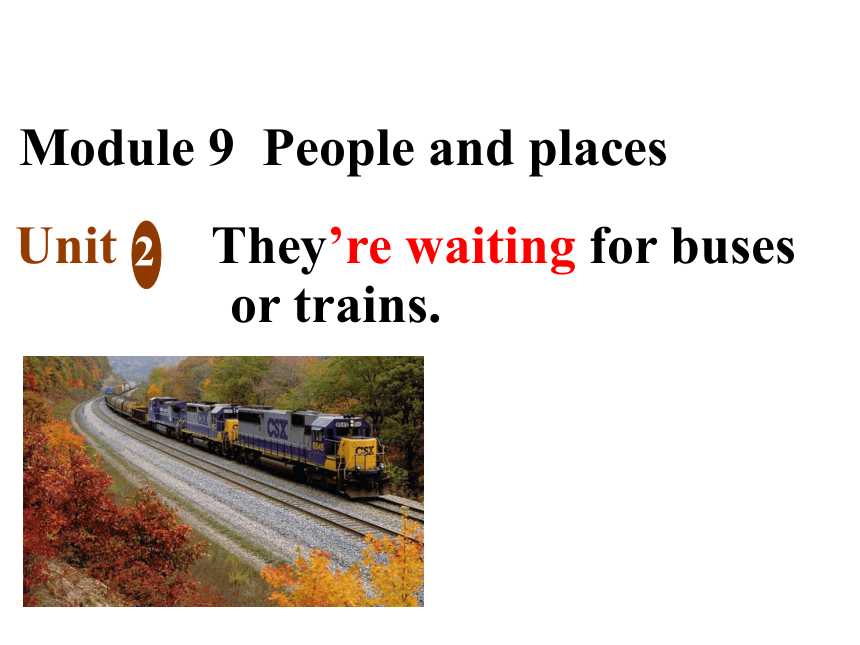
|
|
| 格式 | zip | ||
| 文件大小 | 3.8MB | ||
| 资源类型 | 教案 | ||
| 版本资源 | 外研版 | ||
| 科目 | 英语 | ||
| 更新时间 | 2015-02-03 19:38:03 | ||
图片预览


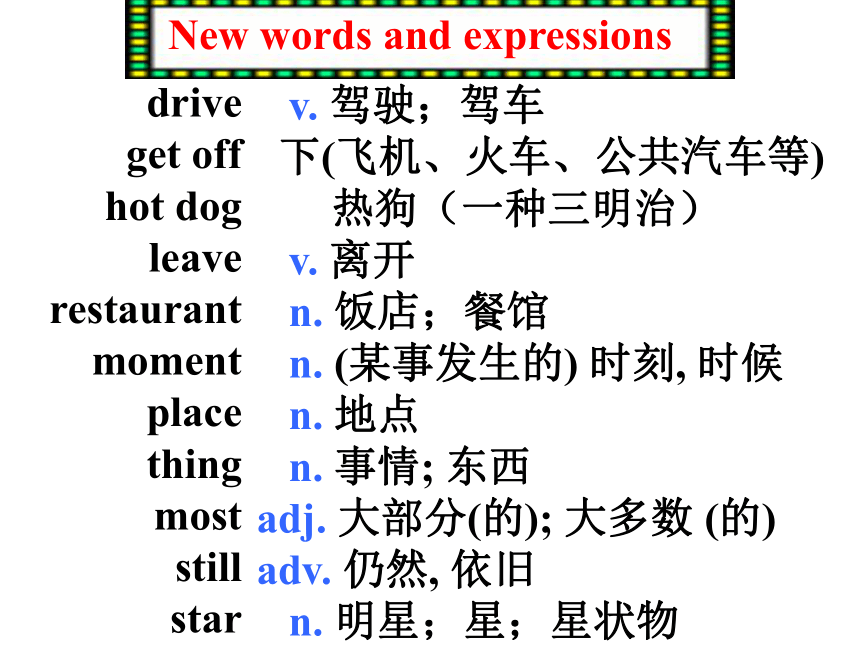
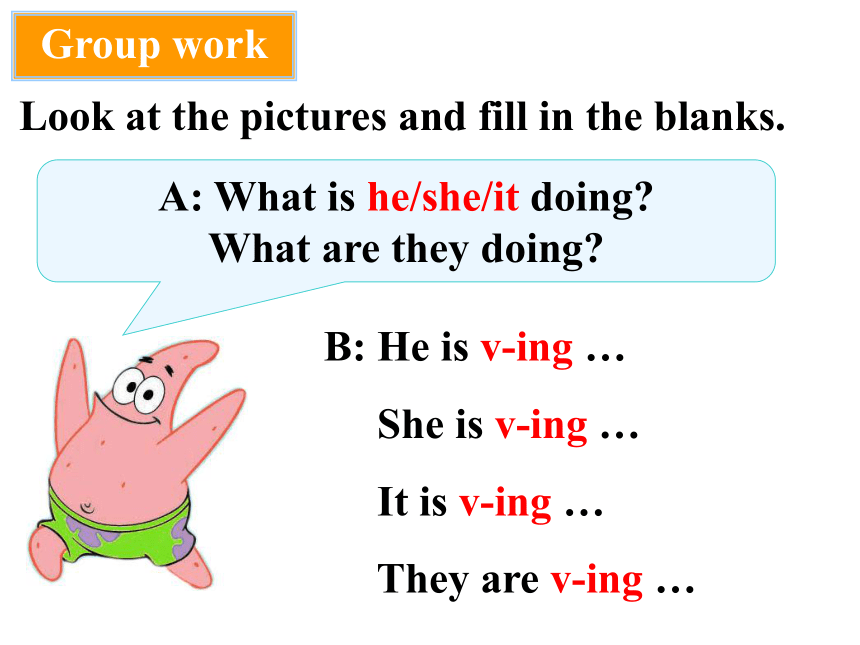
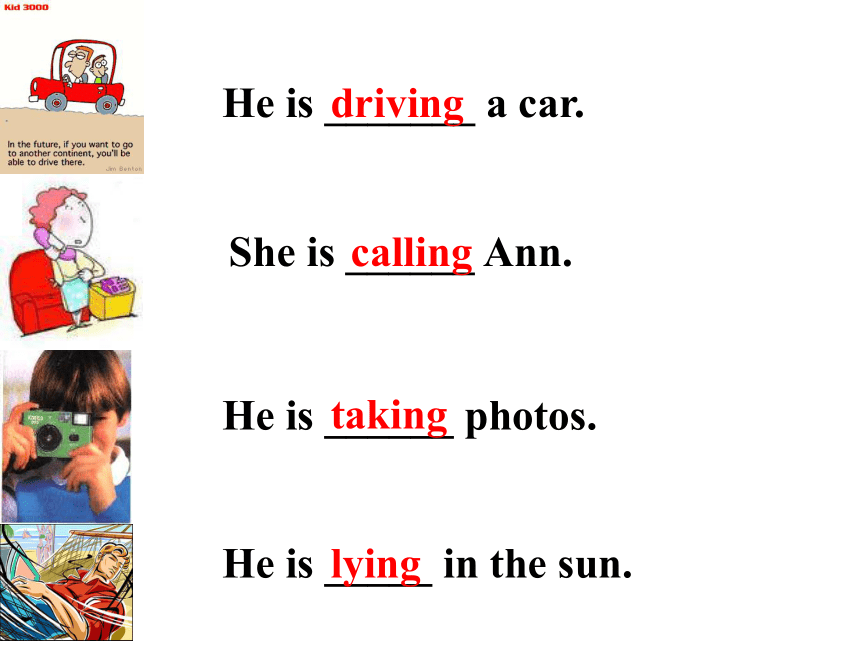
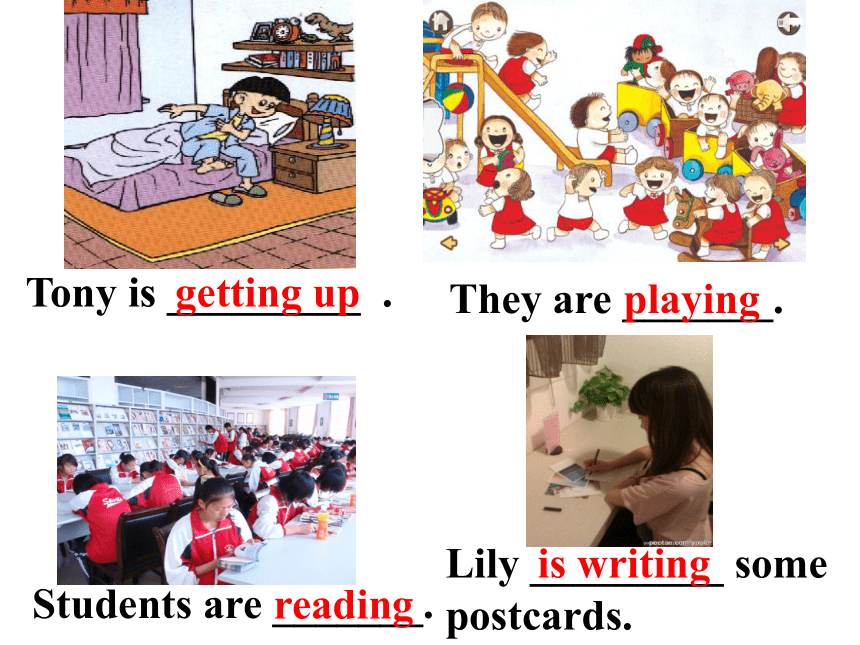
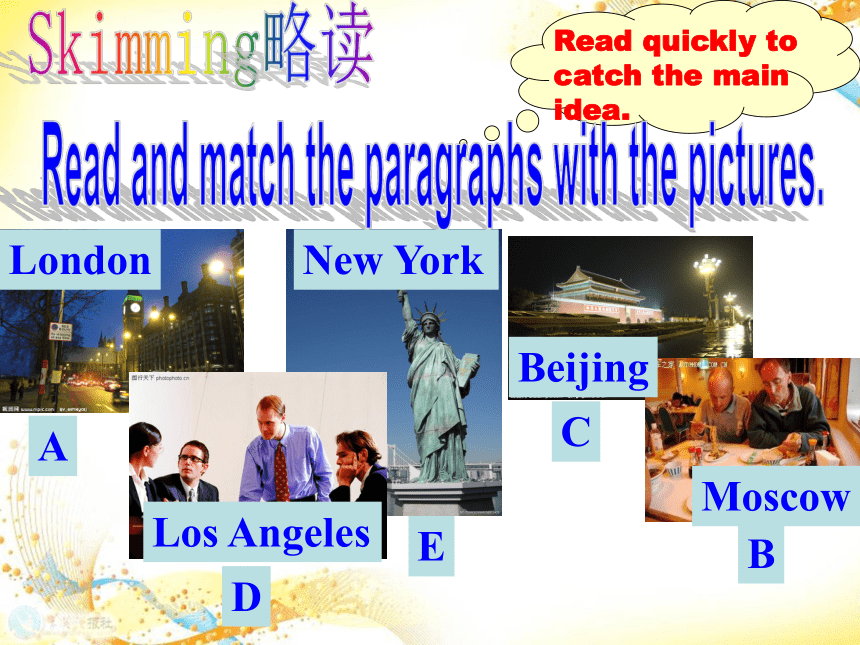
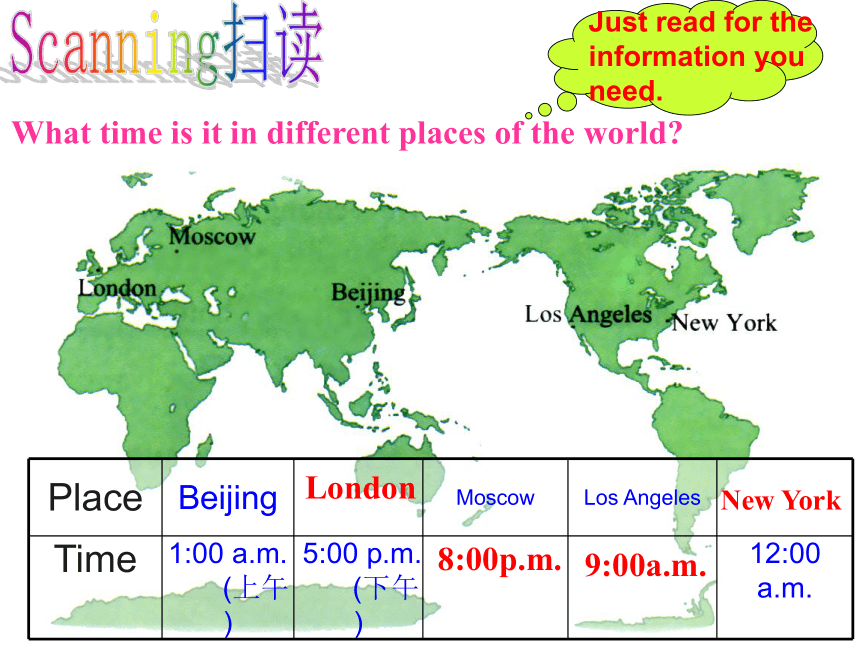
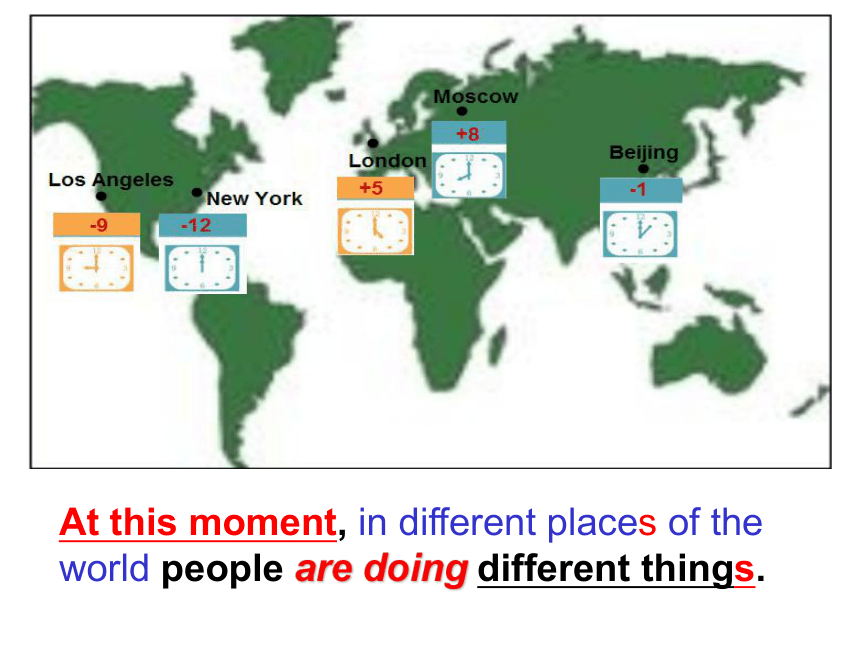

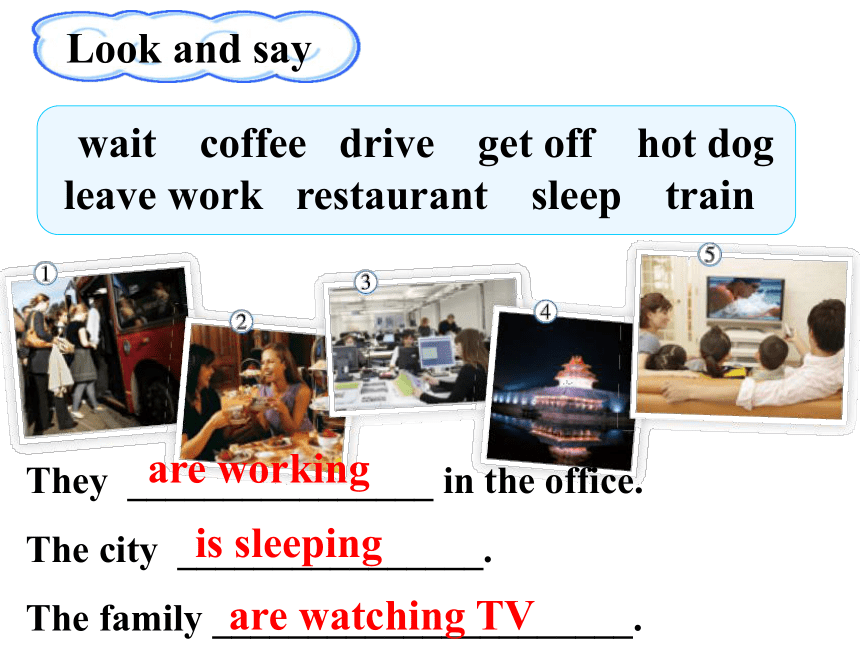

文档简介
课件37张PPT。Module 9 People and places Unit They’re waiting for buses
or trains. 伦敦(英国首都)
莫斯科(俄罗斯首都)
洛杉矶
纽约
v. 驾驶;驾车
下(飞机、火车、汽车等)
热狗(一种三明治)
v. 离开
n. 饭店;餐馆
n. (某事发生的) 时刻, 时候
n. 地点
n. 事情; 东西
London
Moscow
Los Angeles
New York
drive
get off
hot dog
leave
restaurant
moment
place
thingNew words and expressions/dra?v//get ?f//h?t d?g//li:v//'rest?r?nt//'m??m?nt//ple?s//θ??//'l?nd?n//'m?sk??//l?s'?nd??l?s//nju?’ j??k/ v. 驾驶;驾车
下(飞机、火车、公共汽车等)
热狗(一种三明治)
v. 离开
n. 饭店;餐馆
n. (某事发生的) 时刻, 时候
n. 地点
n. 事情; 东西
adj. 大部分(的); 大多数 (的)
adv. 仍然, 依旧
n. 明星;星;星状物drive
get off
hot dog
leave
restaurant
moment
place
thing
most
still
starNew words and expressionsB: He is v-ing …
She is v-ing …
It is v-ing …
They are v-ing … A: What is he/she/it doing?
What are they doing?Group workLook at the pictures and fill in the blanks.He is _______ a car.He is _____ in the sun.He is ______ photos.She is ______ Ann.lyingtakingcallingdrivingTony is _________ .They are _______. playinggetting upStudents are _______.readingLily _________ some postcards. is writingSkimming略读Read and match the paragraphs with the pictures.AEDCBLondonNew YorkBeijingMoscowLos AngelesWhat time is it in different places of the world?London8:00p.m.9:00a.m.New YorkScanning扫读At this moment, in different places of the world people are doing different things.Look and say wait coffee drive get off hot dog leave work restaurant sleep trainThey ________________ the bus.
They ________________ the bus.
They ________________coffee in the restaurant.are waiting forare getting offare drinkingLook and say wait coffee drive get off hot dog leave work restaurant sleep trainThey ________________ in the office.
The city ________________.
The family ______________________.are workingis sleepingare watching TVFast reading1 In London,
2 In Moscow,
3 In Beijing,
4 In Los Angeles,
5 In New York,people aren’t leaving work/people are going home.people aren’t going to the theatre/people are having dinner.people are watching a film/people are sleeping.people are working/people are getting up.people are getting up/people are having lunch.5:00pmleave work,go home,wait for buses, drive home,get off the buses,have afternoon tea,have a drink8:00pmhave dinner, go to the theatre, watch a film, watch TV, play gameshave afternoon teahave dinnersleep, work, go home from..1:00amworkhave lunch, eat…drink….,
see friends,call home ,shopsleep12:00amwork, start their lessons9:00amAll over the world, people are doing different
(1) ____________. At the (2) ___________, it’s five o’clock in London and people are going home from work. People in Moscow are having dinner at home or in (3) ______________. In Beijing, (4)_________
people are sleeping, but some are (5 ) _________ working.moment most restaurant still thingthingsmomentrestaurantsmoststillFill in the blanks.Listen and repeat
5:00pmleave work,go home,wait for buses, drive home,get off the buses,have afternoon tea,have a drink8:00pmhave dinner, go to the theatre, watch a film, watch TV, play gameshave afternoon teahave dinnersleep, work, go home from..1:00amworkhave lunch, eat…drink….,
see friends,call home ,shopsleep12:00amwork, start their lessons9:00amIn , it’s o’clock in the and people are … Some are …or…,some are… they aren’t …Look at thetable and retell:Language points1. Some are getting off buses or trains.
一些人正在下汽车或火车。 off 为介词,意思是下(飞机,汽车,火车等)。 例如:That’ my bicycle, please get off it?.
这是我的自行车,请你下车吧。
get off 的反义词是get on, 意思是上(车、床、飞机等)?。
例如:Here comes the train. Let’s get on.
火车来了,上车吧。 Language points2. They’re waiting for buses or trains.
他们有的在等公共汽车或火车。wait 意思是 “等待,等候”,是不及物动词。当其后面跟宾语时,一定要加介词for。
wait for sb./sth.,意思为“等某人/物”;
wait for sb. to do sth.,意思是“等待某人去做某事”。例如:I’m waiting for your letter.
She is waiting to go home.
3. People are leaving work and are going home.
人们正下班往家赶。
leave work 下班
leave 为及物动词,“离开,起身”。
leave +sp. 表离开某地。
leave sp. for sp.表“离开某地去某地”。
例如: I am leaving Guangzhou for Beijing now.
我正要离开广州去北京。Language pointsLanguage points1. Children are starting their lessons. 孩子们正要开始上课。 start是动词,意为"开始",其后可跟名词、代词,也可跟动词的适当形式。当后面接动词时,可用动词的-ing形式,也可接不定式,意义没有明显区别。如:
What time do you start your class?你们几点上课?
The baby starts to cry / crying.那个孩子开始哭了。【拓展】
begin与start意义和用法相似,一般情况下可以互换。如:
He begins / starts to talk with me.
他开始和我讲话。 ???但是start除了表示"开始"外,还可以表示"发动引擎;出发", 而begin并没有此词义。如:
Come and help me. I can’t start the car.
过来帮帮我,这辆车我发动不起来。
We want to start at six.我们想六点钟出发。2. put on your clothes 穿上衣服 put on意为"穿上,戴上", 通常用来指穿衣的动作,其反义词是take off "脱下"。如:
Jim is putting on his shoes.
吉姆正在穿鞋子。
It’s hot in the room. You can take off your coat.
房间里很热,你可以脱下你的外套。 put on 与 wear 的区别 :
put on 表示“穿”的动作,wear表“穿” 的状态。
It’s cold. Put on your coat, please.
天冷,请穿上你的外套。
He likes wearing black clothes.
他喜欢穿黑色的衣服。【拓展】【拓展】
have on和dress也可以表示“穿”, 但用法和put on各有不同。
★have on通常用来指穿衣的状态。
She has on a new coat today.
她今天穿着一件新外套。
★dress后通常接人;当表示穿着某种颜色的衣服时,通常与in连用。
He often dresses in black.
他通常穿黑色的衣服。Quiz1 下班
2 下公交车
3 开车回家
4 喝下午茶
5 看电影
6 等公交车
7 go to the theatre
8 see friends
9 eat hot dogs
10 play games
leave work
get off busesdrive homehave/drink afternoon teawatch a filmwait for buses去剧院,去看戏看望朋友吃热狗玩游戏What are your family doing at this moment?It’s…o’clock, so I am… in the classroom. And my father is… My mother is…father driveuncle workaunt drinksister callgrandmother wait formother…
brother…
…For exampleDear Mom and Dad,
Greetings from the Great Wall!
I’m standing on the Great Wall of China and writing this postcard to you. We’re on a school trip and we’re having a good time. At this moment, Wang Hui is taking lots of pictures and Lingling is buying some presents and postcards. We’re enjoying the school trip a lot. See you soon!
Love,
Betty Dear Mom and Dad,
Greetings from the Great Wall!
_________________________________________________
_________________________________________________
_________________________________________________
__________________________________________________
Love,
Betty writing
1 玩得很愉快
2 买些礼物
3 照相
4 穿上衣服
5 中国长城
6 在太阳下 have a good time
buy some presents
take photos
put on the clothes
the Great Wall of China
in the sun一、写出下列词组。Quiz二、请写出下列动词的 V-ing 形式。
1. It’s five o’clock and people __________ (离开) work.
2. It’s nine o’clock and people __________ up. (起床) are leaving are getting3. The child ________ on the clothes.(穿上)
4. They _________ friends. (探望)
5. She _________ the sweater. (洗) is puttingare seeing is washing三、句型转换。 She can speak Chinese. (改为一般疑问句)
___ ___ _____ Chinese?
2. She is eating an ice cream. (改为否定句)
She ___ ______ an ice cream.
3. She has supper at home. (改为一般疑问句)
____ ___ ____ supper at home? Can she speak Does she have isn’t eating4. She is doing her homework. (改为否定句)
She ____ _____ her homework.
5. Please send me a postcard. (改为同义句)
Please send a postcard __ __. isn’t doing to me1.Remember all the words and useful expressions.
2.Write a composition about the activities of the animals in the zoo.Homework:
提示: 动物园里有很多动物。中午十二点,熊猫正在吃竹子,猴子正在爬树,大象正在睡觉……
Homework Recite all the new phrases we’ve
learned today.
2. Write a postcard to your best friends. Our fathers are giving us too much love.Let’s say to our parents:
Mum, thank you!
For all the ways you cared for me,
For all the love you shared with me,
For always being there for me,
Love you, dad!
You are good at many things,
But, do you know what you are best at?
Being my dad.
or trains. 伦敦(英国首都)
莫斯科(俄罗斯首都)
洛杉矶
纽约
v. 驾驶;驾车
下(飞机、火车、汽车等)
热狗(一种三明治)
v. 离开
n. 饭店;餐馆
n. (某事发生的) 时刻, 时候
n. 地点
n. 事情; 东西
London
Moscow
Los Angeles
New York
drive
get off
hot dog
leave
restaurant
moment
place
thingNew words and expressions/dra?v//get ?f//h?t d?g//li:v//'rest?r?nt//'m??m?nt//ple?s//θ??//'l?nd?n//'m?sk??//l?s'?nd??l?s//nju?’ j??k/ v. 驾驶;驾车
下(飞机、火车、公共汽车等)
热狗(一种三明治)
v. 离开
n. 饭店;餐馆
n. (某事发生的) 时刻, 时候
n. 地点
n. 事情; 东西
adj. 大部分(的); 大多数 (的)
adv. 仍然, 依旧
n. 明星;星;星状物drive
get off
hot dog
leave
restaurant
moment
place
thing
most
still
starNew words and expressionsB: He is v-ing …
She is v-ing …
It is v-ing …
They are v-ing … A: What is he/she/it doing?
What are they doing?Group workLook at the pictures and fill in the blanks.He is _______ a car.He is _____ in the sun.He is ______ photos.She is ______ Ann.lyingtakingcallingdrivingTony is _________ .They are _______. playinggetting upStudents are _______.readingLily _________ some postcards. is writingSkimming略读Read and match the paragraphs with the pictures.AEDCBLondonNew YorkBeijingMoscowLos AngelesWhat time is it in different places of the world?London8:00p.m.9:00a.m.New YorkScanning扫读At this moment, in different places of the world people are doing different things.Look and say wait coffee drive get off hot dog leave work restaurant sleep trainThey ________________ the bus.
They ________________ the bus.
They ________________coffee in the restaurant.are waiting forare getting offare drinkingLook and say wait coffee drive get off hot dog leave work restaurant sleep trainThey ________________ in the office.
The city ________________.
The family ______________________.are workingis sleepingare watching TVFast reading1 In London,
2 In Moscow,
3 In Beijing,
4 In Los Angeles,
5 In New York,people aren’t leaving work/people are going home.people aren’t going to the theatre/people are having dinner.people are watching a film/people are sleeping.people are working/people are getting up.people are getting up/people are having lunch.5:00pmleave work,go home,wait for buses, drive home,get off the buses,have afternoon tea,have a drink8:00pmhave dinner, go to the theatre, watch a film, watch TV, play gameshave afternoon teahave dinnersleep, work, go home from..1:00amworkhave lunch, eat…drink….,
see friends,call home ,shopsleep12:00amwork, start their lessons9:00amAll over the world, people are doing different
(1) ____________. At the (2) ___________, it’s five o’clock in London and people are going home from work. People in Moscow are having dinner at home or in (3) ______________. In Beijing, (4)_________
people are sleeping, but some are (5 ) _________ working.moment most restaurant still thingthingsmomentrestaurantsmoststillFill in the blanks.Listen and repeat
5:00pmleave work,go home,wait for buses, drive home,get off the buses,have afternoon tea,have a drink8:00pmhave dinner, go to the theatre, watch a film, watch TV, play gameshave afternoon teahave dinnersleep, work, go home from..1:00amworkhave lunch, eat…drink….,
see friends,call home ,shopsleep12:00amwork, start their lessons9:00amIn , it’s o’clock in the and people are … Some are …or…,some are… they aren’t …Look at thetable and retell:Language points1. Some are getting off buses or trains.
一些人正在下汽车或火车。 off 为介词,意思是下(飞机,汽车,火车等)。 例如:That’ my bicycle, please get off it?.
这是我的自行车,请你下车吧。
get off 的反义词是get on, 意思是上(车、床、飞机等)?。
例如:Here comes the train. Let’s get on.
火车来了,上车吧。 Language points2. They’re waiting for buses or trains.
他们有的在等公共汽车或火车。wait 意思是 “等待,等候”,是不及物动词。当其后面跟宾语时,一定要加介词for。
wait for sb./sth.,意思为“等某人/物”;
wait for sb. to do sth.,意思是“等待某人去做某事”。例如:I’m waiting for your letter.
She is waiting to go home.
3. People are leaving work and are going home.
人们正下班往家赶。
leave work 下班
leave 为及物动词,“离开,起身”。
leave +sp. 表离开某地。
leave sp. for sp.表“离开某地去某地”。
例如: I am leaving Guangzhou for Beijing now.
我正要离开广州去北京。Language pointsLanguage points1. Children are starting their lessons. 孩子们正要开始上课。 start是动词,意为"开始",其后可跟名词、代词,也可跟动词的适当形式。当后面接动词时,可用动词的-ing形式,也可接不定式,意义没有明显区别。如:
What time do you start your class?你们几点上课?
The baby starts to cry / crying.那个孩子开始哭了。【拓展】
begin与start意义和用法相似,一般情况下可以互换。如:
He begins / starts to talk with me.
他开始和我讲话。 ???但是start除了表示"开始"外,还可以表示"发动引擎;出发", 而begin并没有此词义。如:
Come and help me. I can’t start the car.
过来帮帮我,这辆车我发动不起来。
We want to start at six.我们想六点钟出发。2. put on your clothes 穿上衣服 put on意为"穿上,戴上", 通常用来指穿衣的动作,其反义词是take off "脱下"。如:
Jim is putting on his shoes.
吉姆正在穿鞋子。
It’s hot in the room. You can take off your coat.
房间里很热,你可以脱下你的外套。 put on 与 wear 的区别 :
put on 表示“穿”的动作,wear表“穿” 的状态。
It’s cold. Put on your coat, please.
天冷,请穿上你的外套。
He likes wearing black clothes.
他喜欢穿黑色的衣服。【拓展】【拓展】
have on和dress也可以表示“穿”, 但用法和put on各有不同。
★have on通常用来指穿衣的状态。
She has on a new coat today.
她今天穿着一件新外套。
★dress后通常接人;当表示穿着某种颜色的衣服时,通常与in连用。
He often dresses in black.
他通常穿黑色的衣服。Quiz1 下班
2 下公交车
3 开车回家
4 喝下午茶
5 看电影
6 等公交车
7 go to the theatre
8 see friends
9 eat hot dogs
10 play games
leave work
get off busesdrive homehave/drink afternoon teawatch a filmwait for buses去剧院,去看戏看望朋友吃热狗玩游戏What are your family doing at this moment?It’s…o’clock, so I am… in the classroom. And my father is… My mother is…father driveuncle workaunt drinksister callgrandmother wait formother…
brother…
…For exampleDear Mom and Dad,
Greetings from the Great Wall!
I’m standing on the Great Wall of China and writing this postcard to you. We’re on a school trip and we’re having a good time. At this moment, Wang Hui is taking lots of pictures and Lingling is buying some presents and postcards. We’re enjoying the school trip a lot. See you soon!
Love,
Betty Dear Mom and Dad,
Greetings from the Great Wall!
_________________________________________________
_________________________________________________
_________________________________________________
__________________________________________________
Love,
Betty writing
1 玩得很愉快
2 买些礼物
3 照相
4 穿上衣服
5 中国长城
6 在太阳下 have a good time
buy some presents
take photos
put on the clothes
the Great Wall of China
in the sun一、写出下列词组。Quiz二、请写出下列动词的 V-ing 形式。
1. It’s five o’clock and people __________ (离开) work.
2. It’s nine o’clock and people __________ up. (起床) are leaving are getting3. The child ________ on the clothes.(穿上)
4. They _________ friends. (探望)
5. She _________ the sweater. (洗) is puttingare seeing is washing三、句型转换。 She can speak Chinese. (改为一般疑问句)
___ ___ _____ Chinese?
2. She is eating an ice cream. (改为否定句)
She ___ ______ an ice cream.
3. She has supper at home. (改为一般疑问句)
____ ___ ____ supper at home? Can she speak Does she have isn’t eating4. She is doing her homework. (改为否定句)
She ____ _____ her homework.
5. Please send me a postcard. (改为同义句)
Please send a postcard __ __. isn’t doing to me1.Remember all the words and useful expressions.
2.Write a composition about the activities of the animals in the zoo.Homework:
提示: 动物园里有很多动物。中午十二点,熊猫正在吃竹子,猴子正在爬树,大象正在睡觉……
Homework Recite all the new phrases we’ve
learned today.
2. Write a postcard to your best friends. Our fathers are giving us too much love.Let’s say to our parents:
Mum, thank you!
For all the ways you cared for me,
For all the love you shared with me,
For always being there for me,
Love you, dad!
You are good at many things,
But, do you know what you are best at?
Being my dad.
同课章节目录
- Starte
- Module 1 My teacher and my friends
- Module 2 My English lesson
- Module 3 My English book
- Module 4 My everyday life
- Module 1 My classmates
- Unit 1 Nice to meet you.
- Unit 2 I'm Wang Lingling and I'm thirteen years ol
- Unit 3 Language in use.
- Module 2 My family
- Unit 1 Is this your mum?
- Unit 2 These are my parents.
- Unit 3 Language in use.
- Module 3 My school
- Unit 1 There are thirty students in my class.
- Unit 2 The library is on the left of the playgroun
- Unit 3 Language in use.
- Module 4 Healthy food
- Unit 1 We've got lots of apples.
- Unit 2 Is your food and drink healthy?
- Unit 3 Language in use.
- Module 5 My school day
- Unit 1 I love history.
- Unit 2 We start work at nine o'clock.
- Unit 3 Language in use.
- Revision module A
- Module 6 A trip to the zoo
- Unit 1 Does it eat meat?
- Unit 2 The tiger lives in Asia.
- Unit 3 Language in use.
- Module 7 Computers
- Unit 1 How do I write my homework on the computer?
- Unit 2 When do you use a computer?
- Unit 3 Language in use.
- Module 8 Choosing presents
- Unit 1 I always like birthday parties.
- Unit 2 She often goes to concerts.
- Unit 3 Language in use.
- Module 9 People and places
- Unit 1 We're enjoying the school trip a lot.
- Unit 2 They're waiting for buses or trains.
- Unit 3 Language in use.
- Module 10 Spring Festival
- Unit 1 Are you getting ready for Spring Festival?
- Unit 2 My mother's cleaning our houses and sweepin
- Unit 3 Language in use.
- Revision module B
